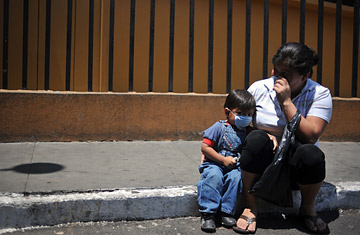
A woman and her son cover their faces with surgical masks at the entrance of Guatemala City's San Juan de Dios General Hospital
There are many fears about the swine flu outbreak. It is not simply that it could cause the death of thousands or in the case of a pandemic, perhaps millions. Other fears are economic in nature based on the reality that tens of millions of very sick people would drive a weak global economy into a depression.
The experts who analyze the failures of the economies of the largest countries in the world got a chance, for the first time since the downturn began, to contemplate what would happen if one more leg is kicked off the stool. The stock market responded with a shudder yesterday but at least did not collapse in response to the weekend media blitz about the Swine Flu outbreak. The reaction of the world's markets is likely to be close to panic if this disease becomes widespread and lethal. (See pictures of the swine flu outbreak in Mexico.)
Economists do not spend much time looking beyond the borders of the recession. It would be too alarming to calculate what one catastrophe on top of another could cause. But, catastrophes are catastrophes because they are largely beyond human intervention, and there are two that the world cannot afford now.
There have been a number of estimates as to the financial effects of a pandemic. Some range as high as a 5% drop in global GDP. The calculations that would go into an exercise to come up with a reasonable guess would require more work than the entire length of the recession would allow. But, a pandemic is a long shot for several reasons. The most obvious reason is that healthcare and disease monitoring are much more sophisticated now than they were just six years ago at the beginning of the SARS epidemic, which turned out fortunately not to be an epidemic at all. (Read a TIME story on the lessons learned from SARS.)
The more realistic threat is one of terrorism backed by extremists. The U.S. government is right to point out that there have been no attacks on American soil since 911, but there have been violent incidents in Spain, the U.K., India, and a number of other countries where homeland security is not as good as it is in the U.S. The fact that as recently as 2004, terrorists could kill more than 170 people on the Madrid commuter railroad system is an extraordinary reminder that some parts of the social and business infrastructure in the developed world are still terribly vulnerable. The notion that terrorists could attack commuter trains going in or out of New York City is imaginable and, perhaps even possible. (Read a TIME story on 5 years after the Madrid bombing.)
One of the few advantages that anarchists have is that they can act on their own timetable while nations playing defense must be vigilant at all times. A keep must be guarded constantly, even if it is rarely attacked.
No one will know whether the swine flu news caused both the physicians working for the government and the homeland security experts to look once again at what else a weak economy could survive. There is an answer and it is that the economy can't take much more.
— Douglas A. McIntyre
Read a TIME story on the 5 things you need to know about swine flu.
For constant business updates, go to 24/7wallst.com.
